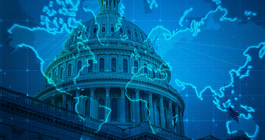
February 23, 2017
I used an all-gender bathroom once. It went like most bathroom visits go: did my business, washed my hands and left.
For me, it was a matter of convenience. It was the closest bathroom. Since I was working at the time, it also served the purpose of writing a quick-hit story about the experience. (Fine, it helped fill time during a boring spell at the DNC, too.)
For others, though, it’s a matter of emotional necessity. Relieving oneself “in accordance with their expressed gender identity and not just their biological sex” makes them more comfortable in their own skin.
With Wednesday’s news that the Trump administration ended federal protections instructing schools to allow transgender students to use bathrooms and locker rooms matching their gender identities, that comfort level ended for some marginalized youths. Cold and heartless!
As with everything that happens in America these days, there was pushback.
Gov. Tom Wolf noted, on Twitter, that he will “do everything I can to make sure Pennsylvania remains a place where everyone feels welcome. #WeAreNotThis.”
Staying on the local level, Mayor Jim Kenney declared, "This act shows a lack of compassion and understanding for millions of young people around the country who are simply trying to be themselves. … The City of Philadelphia will continue to stand with transgender students even if the Federal government refuses to.”
That message was reinforced by Dr. William Hite Jr., superintendent of the School District of Philadelphia, who said his district “remains a safe and welcoming place of inclusion for all our students.”
Let's focus on local reactions because, at the heart of the protections’ removal, is the stance that states and locals should decide their positions on said policies.
That’s all well and good if you’re of the mind that state and local officials would have instituted the Civil Rights Act of 1964 on their own hadn’t it been federal law. (Spoiler alert: Everybody wouldn’t have.)
Since they’ve eradicated mandatory protections meant to protect vulnerable citizens in the name of giving locals a say, though, there's a parallel to another hot-button issue being decided by locals and infuriating those with nationalistic minds.
That’s right, I’m talking about sanctuary cities! Including the one in which I’m writing this!
Since the Trump administration is A-OK with turning the transgender-bathrooms issue into a state-level one, logic dictates that it should be A-OK with turning the sanctuary-city issue into a local one as well.
Their underlying premise is that locals are better equipped to decide whether they should institute those bathrooms in their schools. Fine. Maybe some folks in Oklahoma and Arkansas aren’t as committed to protect transgender youths and those in Philadelphia or San Francisco. Or maybe it’s something else. I don’t purport to speak for flyover strangers.
But if we’re going to let those folks in Oklahoma and Arkansas make big-picture decisions for themselves without federal government interference, we should let folks in Philadelphia and San Francisco make big-picture decisions regarding sanctuary-city statuses for themselves, too.
Officials sticking to that policy in Philadelphia and other sanctuary cities are much better versed in how it impacts their specific communities than those hundreds of miles away who’ve decided it’s OK to play extortionist and threaten to withhold funding if they don’t comply with a policy with which they disagree. (Psst: Crime does go down in those places despite doubting foes.)
Sorry, but they can’t hide behind state’s rights on one controversial issue while deriding it in another. That's hypocrisy in good-for-the-goose, not-good-for-the-gander action from a philosophical perspective.
Legal and quick-to-comment-anonymously minds will most assuredly maintain that regulations (regarding bathrooms) don't have the same hold as federal laws (immigration). They would be right, too.
All I'm saying is that if you argue that locals have enough wisdom to decide civil-rights protections for themselves, granting them the power to examine the impact of immigration – both legal and illegal – in their backyards and govern accordingly is nothing short of fair.